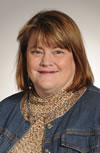In The News
Heidi Beaver, MPH, St. Luke's Hospital

Women can improve their health by knowing family history
The phrase "it's in the genes" is no truer than when it comes to disease risks. Almost every disease is influenced in part by a person's genetic make-up. But rather than use that as an excuse for poor health, knowing your family medical history can be a powerful way to assess your risks and reduce the probability of developing many common diseases.
For women, Type II diabetes, heart disease and certain cancers including breast, ovarian, pancreatic and colon cancer are some of the most common examples where the existence of particular genes or gene mutations contribute to the likelihood of developing a disease. These disorders tend to cluster in families but do not always have clear-cut patterns of inheritance.
If a woman knows she has a genetic risk, she can work with her doctor to minimize the impact of that inherited risk by altering lifestyle and environmental factors within her control.
One of the first steps in determining your genetic risks happens when you fill out a family medical history form at your doctor's office. This information can be essential in helping your doctor determine what your health risks may be, the types of screenings needed and what preventive health steps to consider.
Another way to create a useful snapshot of your genetic health is by taking advantage of a free Web-based tool from the surgeon general called "My Family Health Portrait." You can find it by visiting https://familyhistory.hhs.gov. There, you can document your family medical history. The site allows you to save your information, print it for your doctor and share it with other family members.
A good family history should include information from three generations, including children, brothers and sisters, parents, aunts and uncles, nieces and nephews, grandparents and cousins. It is important to remember that health changes over time, so you should update your family history as needed and share changes with your healthcare providers.
Women should consider making a promise to themselves and their families to create and maintain a family health history. The next family gathering is a great place to start.
Heidi Beaver, MPH, is a certified genetic counselor at St. Luke's Hospital. Call 314-469-3990 or visit the Genetic Counseling Services page.
This article was published in the St. Louis Post-Dispatch on June 4, 2009.
